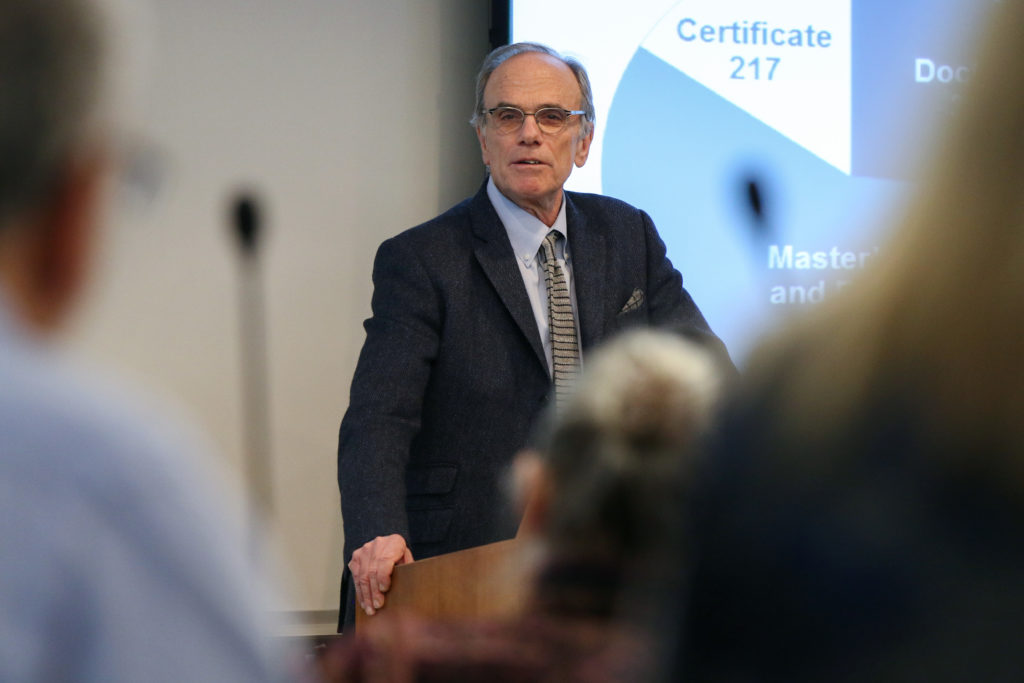The Graduate School of Education and Human Development received an over $2 million grant to spearhead a forum to boost civic engagement in U.S. public schools, according to a University release published late last month.
GSEHD Dean Michael Feuer, who announced in February that he is stepping down from the role in July to focus on GSEHD’s Forum on Democracy and Education, will lead the three-year, $2.4 million grant from the William and Flora Hewlett Foundation. The project — which will consist of a series of forums, masterclasses, briefs and a website where educators can share best practices on civic education — aims to facilitate collaboration between policymakers, teachers and education leaders and provide resources for public schools to increase civic engagement among K-12 students, according to the release.
“The health of democracy depends on an informed and engaged citizenry,” Feuer said in the release. “With support from the Hewlett Foundation, the Forum on Democracy and Education will provide educators with the resources and research needed to integrate civic learning into classrooms nationwide.”
Feuer based the creation of the Forum of Democracy and Education on his 2023 book “Can Schools Save Democracy: Civic Education and the Common Good,” which argues public schools must play a role in promoting interest in the democratic process and increasing civic knowledge among young people.
Students’ history and civics scores are declining nationally, with just 13 percent of eighth graders scoring proficient in U.S. history and only 22 percent in civics in 2022, according to data from the National Assessment of Educational Progress. The results show a five-point decrease in history scores since 2018.
Voter turnout among young people has been historically low compared to other age groups, with 42 percent of eligible voters aged 18-29 casting a ballot in the 2024 election, down from 53 percent in 2020.
The forum will serve as a “collaborative hub” and issue briefs and research papers to public school teachers providing guidance on how to effectively teach students on democratic processes and host masterclasses on incorporating civic education into their curricula, according to the release. The forum will also launch a podcast series featuring education leaders and experts in civic engagement to provide advice for teachers on teaching students about civics.
Experts in civic education said instruction is a crucial factor in increasing civic engagement among youth and the forum should provide teachers with tools to better equip students with experience in civic dialogue in the classroom so they can become engaged citizens.
Liz Evans, the program director for civic education and outreach at Arizona State University, said the forum should provide guidance for other subjects like analyzing political speeches and government documents in English classes.
“There’s been this focus on ELA and science, which those are all important,” Evans said. “And I don’t think that people realize we can actually integrate civics into all of those. It doesn’t have to be this separate thing, but students have to have the knowledge.”
Evans said the project should also encourage teachers to engage students in dialogue about the structures of American government, so they can build off the basic knowledge and learn to form and voice their opinions and set them up to engage in political discourse later in life.
“The ability to work through them and to talk about them with their classmates with a teacher facilitating it is a really powerful thing,” Evans said.
Evans said students may not be interested in civics at a young age because they feel they can’t have any effect on government since they are not old enough to vote. Evans said teachers can help expose students to different forms of activism and empower younger generations to get involved in their community and in politics.
“Students don’t realize you can make changes,” Evans said. “Just because you can’t vote yet doesn’t mean you’re not a citizen. Voting doesn’t make you a citizen. Being a part of your community is what helps make you that citizen.”
Dillan Bono-Lunn, an assistant professor of political science and public policy and faculty fellow for civic engagement at Elon University, said schools play an “important lever” in equipping students with knowledge of civic processes because they need to have a base knowledge to form their own beliefs and participate in democratic processes. She said learning about these processes gives students agency by showing them the tools they have at their disposal to make policy changes they may want to see like volunteering with community organizations.
“These are sort of beliefs, feelings that get sort of wired in K-12, and they help sustain people through their motivation to be civically engaged throughout the rest of their lives,” Bono-Lunn said.
Bono-Lunn said teachers should start civic education while students are young and continue it throughout their education, so they can build on their knowledge of institutions and government processes to develop their own political opinions and beliefs as they get older.
“Students not only need to have a subject level knowledge about a topic, but they need to understand how that reverberates through a political system,” Bono-Lunn said. “And so these are things that take a long time to build.”





